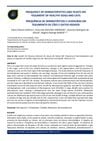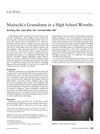Isolation of Dermatophytes from Dogs and Cats with Suspected Dermatophytosis in Western Turkey
December 2010
in “
Preventive Veterinary Medicine
”
TLDR Young dogs and cats in Western Turkey often have skin infections caused by fungi, especially Microsporum canis.
The study aimed to identify dermatophyte species and their prevalence in dogs and cats with suspected dermatophytosis in Western Turkey. A total of 362 animals (198 dogs and 164 cats) were examined, revealing that 14.4% were positive for fungal elements by direct microscopy, and 19.3% were culture positive for dermatophytes. Microsporum canis was the most common species isolated. The prevalence of Trichophyton mentagrophytes was significantly higher in dogs than in cats. Age was a significant risk factor, with animals younger than one year showing higher infection rates. No significant association was found between infection prevalence and the provinces, sex, or season.



